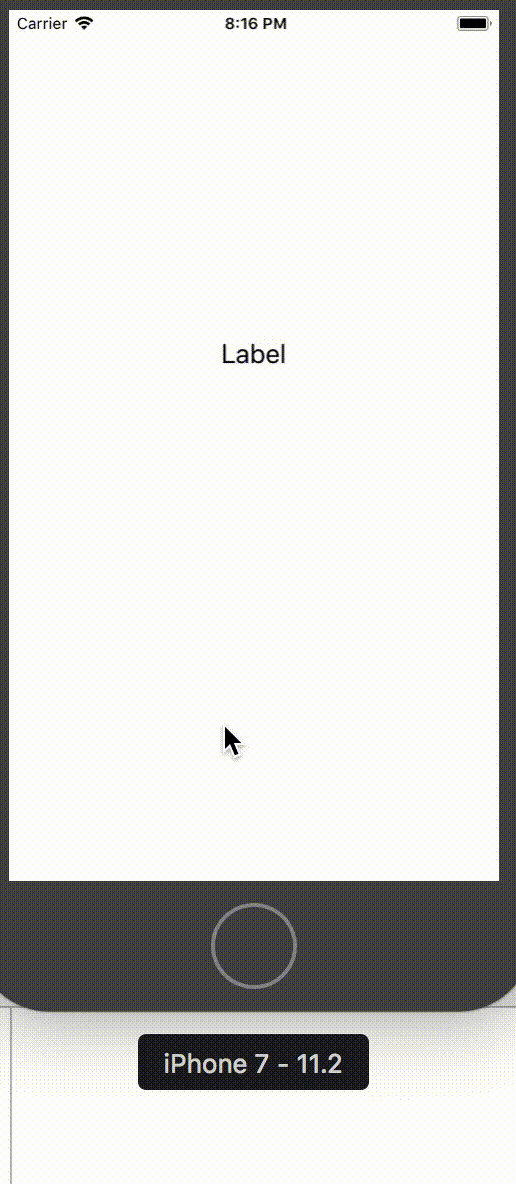Swipe gesture in Swift 3
Step 1: Add swipe Gesture(s) in viewDidLoad() method.
override func viewDidLoad() {
super.viewDidLoad()
let swipeLeft = UISwipeGestureRecognizer(target: self, action: #selector(handleGesture))
swipeLeft.direction = .left
self.view.addGestureRecognizer(swipeLeft)
let swipeRight = UISwipeGestureRecognizer(target: self, action: #selector(handleGesture))
swipeRight.direction = .right
self.view.addGestureRecognizer(swipeRight)
let swipeUp = UISwipeGestureRecognizer(target: self, action: #selector(handleGesture))
swipeUp.direction = .up
self.view.addGestureRecognizer(swipeUp)
let swipeDown = UISwipeGestureRecognizer(target: self, action: #selector(handleGesture))
swipeDown.direction = .down
self.view.addGestureRecognizer(swipeDown)
}
Step 2: Check the gesture detection in handleGesture() method
func handleGesture(gesture: UISwipeGestureRecognizer) {
if gesture.direction == .right {
print("Swipe Right")
}
else if gesture.direction == .left {
print("Swipe Left")
}
else if gesture.direction == .up {
print("Swipe Up")
}
else if gesture.direction == .down {
print("Swipe Down")
}
}
I hope this will help someone.
UPDATE:
You need to use @objc to call your 'Selector' method for latest swift versions. ie,
@objc func handleGesture(gesture: UISwipeGestureRecognizer) -> Void {
.
.
.
}
Swift 4, Xcode 9.2 This code will enable you to Recognize the Swipe Direction of the user on the whole ViewController (All of the iPhone screen, not specific to a button) Thanks @Ram-madhavan
import UIKit
class ViewController: UIViewController {
//Label to show test and see Gesture direction.
@IBOutlet weak var swipeDirectionLabel: UILabel!
override func viewDidLoad() {
super.viewDidLoad()
//Defining the Various Swipe directions (left, right, up, down)
let swipeLeft = UISwipeGestureRecognizer(target: self, action: #selector(self.handleGesture(gesture:)))
swipeLeft.direction = .left
self.view.addGestureRecognizer(swipeLeft)
let swipeRight = UISwipeGestureRecognizer(target: self, action: #selector(self.handleGesture(gesture:)))
swipeRight.direction = .right
self.view.addGestureRecognizer(swipeRight)
let swipeUp = UISwipeGestureRecognizer(target: self, action: #selector(self.handleGesture(gesture:)))
swipeUp.direction = .up
self.view.addGestureRecognizer(swipeUp)
let swipeDown = UISwipeGestureRecognizer(target: self, action: #selector(self.handleGesture(gesture:)))
swipeDown.direction = .down
self.view.addGestureRecognizer(swipeDown)
}
//Function to Print to console Swipe Direction, and Change the label to show the directions. The @objc before func is a must, since we are using #selector (above). You can add to the function, in my case, I'll add a sound, so when someone flips the page, it plays a page sound.
@objc func handleGesture(gesture: UISwipeGestureRecognizer) -> Void {
if gesture.direction == UISwipeGestureRecognizerDirection.right {
print("Swipe Right")
swipeDirectionLabel.text = "Swiped Right"
}
else if gesture.direction == UISwipeGestureRecognizerDirection.left {
print("Swipe Left")
swipeDirectionLabel.text = "Swiped Left"
}
else if gesture.direction == UISwipeGestureRecognizerDirection.up {
print("Swipe Up")
swipeDirectionLabel.text = "Swiped Up"
}
else if gesture.direction == UISwipeGestureRecognizerDirection.down {
print("Swipe Down")
swipeDirectionLabel.text = "Swiped Down"
}
}
}

I was having the same problem. Actually, any swipe just crashed my code (from Rob Percival, right?). So I downloaded his finished code, opened it in XCode 8 and let it convert to Swift 3. Two points were changed.
In ViewDidLoad:
let swipeRight = UISwipeGestureRecognizer(target: self, action: #selector(ViewController.swiped(_:)))
And inside the function:
func swiped(_ gesture: UIGestureRecognizer)
In, Swift 3 you can try this.
let swipeRightOrange = UISwipeGestureRecognizer(target: self, action:#selector(slideToRightWithGestureRecognizer))
swipeRightOrange.direction = UISwipeGestureRecognizerDirection.Right;
let swipeLeftOrange:UISwipeGestureRecognizer = UISwipeGestureRecognizer(target: self, action: #selector(slideToLeftWithGestureRecognizer))
swipeLeftOrange.direction = UISwipeGestureRecognizerDirection.Left;
@IBAction func slideToLeftWithGestureRecognizer(gestureRecognizer:UISwipeGestureRecognizer)
{
viewOrange.backgroundColor = UIColor.blueColor()
}
@IBAction func slideToRightWithGestureRecognizer
(gestureRecognizer:UISwipeGestureRecognizer)
{
viewOrange.backgroundColor = UIColor.lightGrayColor()
}
var swipeGesture = UISwipeGestureRecognizer()
Take view and set IBOutlet:
@IBOutlet weak var viewSwipe: UIView!
Write this pretty code on viewDidLoad()
let direction: [UISwipeGestureRecognizerDirection] = [.up, .down, .left, .right]
for dir in direction{
swipeGesture = UISwipeGestureRecognizer(target: self, action: #selector(self.swipeView(_:)))
viewSwipe.addGestureRecognizer(swipeGesture)
swipeGesture.direction = dir
viewSwipe.isUserInteractionEnabled = true
viewSwipe.isMultipleTouchEnabled = true
}
Now, this is method is calling when swipe gesture is recognized.
@objc func swipeView(_ sender:UISwipeGestureRecognizer){
UIView.animate(withDuration: 1.0) {
if sender.direction == .right{
self.viewSwipe.frame = CGRect(x: self.view.frame.size.width - self.viewSwipe.frame.size.width, y: self.viewSwipe.frame.origin.y, width: self.viewSwipe.frame.size.width, height: self.viewSwipe.frame.size.height)
}else if sender.direction == .left{
self.viewSwipe.frame = CGRect(x: 0, y: self.viewSwipe.frame.origin.y, width: self.viewSwipe.frame.size.width, height: self.viewSwipe.frame.size.height)
}else if sender.direction == .up{
self.viewSwipe.frame = CGRect(x: self.view.frame.size.width - self.viewSwipe.frame.size.width, y: 0, width: self.viewSwipe.frame.size.width, height: self.viewSwipe.frame.size.height)
}else if sender.direction == .down{
self.viewSwipe.frame = CGRect(x: self.view.frame.size.width - self.viewSwipe.frame.size.width, y: self.view.frame.size.height - self.viewSwipe.frame.size.height, width: self.viewSwipe.frame.size.width, height: self.viewSwipe.frame.size.height)
}
}
}
100% working in my project and tested